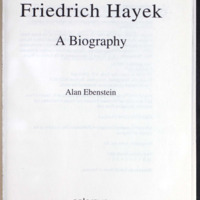-
Title
-
Friedrich Hayek : a biography
-
Description
-
This book tells the story of one of the most important public figures of the twentieth century. It is the first full biography of Friedrich Hayek, the Austrian economist who became the greatest philosopher of liberty in our time.."In this detailed portrait, Alan Ebenstein chronicles the life, works, and legacy of a visionary thinker, from Hayek's early years as the scholarly son of a physician in fin de siecle Vienna to his remarkable career as an economist and political philosopher in London, New York, and Chicago. It was an immensely fruitful life, set against two world wars, the Great Depression, the rise of Nazism, and, during his last years, the historic emergence of free market societies from the collapse of Communism. Throughout it all Hayek struggled - in a brilliant circle of economists, philosophers, political scientists, and other intellectuals - to come to grips with the wrenching transformations of the modern world."--BOOK JACKET.
-
Identifier
-
958480
-
312233442
-
Creator
-
Ebenstein, Alan O
-
Source
-
Brian Lamb Booknotes Collection
-
Gift of Brian Lamb, 2011.
-
Catalog record
-
Language
-
eng
-
Date
-
2001
-
Program air date: July 8, 2001
-
Publisher
-
Palgrave
-
George Mason University. Libraries. Special Collections & Archives
-
Text
-
Transcription of Annotations
Notes from front endpapers: "Wed., May 10. - Friedrich August von Hayek, b. May 8, 1899, d. March 23, 1992. - Road to Serfdom, 1944; lived in U.S. 1950-1962; divorce of 1st wife. - Nobel Prize 1974 - classical liberal and libertarian movements. - Thatcher endorsed him; Chicago, Freiburg, Salzburg - U. of S. '69''77 - period "somewhat disappointing". - 20 major works in 59 years (1929-1988, p. 325.) - 1945: British election: Churchill "the Gestapo Speech" hurt him, ref. to Hayek. - 'Road to Serfdom' - turned down by 3 U.S. publishers; M. Freedman - pub. suppressed (p. 131); 1st printing: 2000 at U. of Chi., 2nd 5000 copies; Readers' Digest Apr. 1945: Winston C. spoke of it; lecture tour '45, "no speaking expense". - Mont Pelerin Society, p. 142; 1938 conference in Paris, W. Lippmann attends; La Colloque Lippmann. - Apr. 1-10, 1947 Conference in Switzerland: 39 individuals from 10 countries; meetings in secret; statement of aims (p. 145); wanted to call it Acton-Tocqueville Society - can't name it after two Catholics. - He was not a conservative, he believed in change, p. 224; environmentalist - endorsed World Wildlife fund; not a strong supporter of 2nd amend.; homosexuality - private matter. - Suffered from ill health and depression, '69 to '74; 2 heart attacks, deaf in left ear, no hobbies; lost weight in later years, going from 200 to 160 lbs. - 'Road to Serfdom' - idea came from Tocqueville, p. 116. - Robert Owen - first to use term socialism; Fabian Society - Sidney Webb founded LSE. - Impact of WWI and the Depression on socialism. - Competition, smaller government, classical liberal, rejected central national disribution of welfare, endorsed some of Marx; inflation - bad, [?] price controls. - Worked on 'Law, Legislation and Liberty' for 16 years, the longest. - Believed in ending government monopoly of the money supply. - He was a socialist, age 17 to 23." - Notes from half title page: "Army - age 18 - piece of shell chipped out; Aristotle: introduced to by a teacher, p. 18. - Dave Hume: "my great idol", outstanding philosopher of liberal and legal theory, p. 249; John Locke, John Stuart Mill; Adam smith; Bernard Mandeville; Thatcher; Reagan met him in London, 1982. - Race, p. 295: children during WWII, would not have to go to school with colored in U.S. - Nobel: shared with Gunnar Myrdal, p. 260, first free market economist to win it. - LSE: created by British socialist and Fabian leader, 1895. - Harold Laski came to LSE 1920 (7 yrs. older than Hayek); Daniel Patrick Moynahan. - Hayek abhorred Laski." -- Notes from back endpapers: "Milton Freedman - first met at Chi 1940's; were not personally close for those 12 years. - Hayek was personally close to Keynes. - Hayek's greatest contribution was in societal philosophy. - Macro (Friedman) vs. micro economics. - Ayn Rand: Hayek is "real poison", p. 275; most influential list of Liberty Mag. (p. 276). - Left Hella in 1949 - divorced in Ark. in 1950, lost Robbins - felt his treatment of 1st wife atrocious; they reconciled after Hella's death. - Karl Popper at LSE: might have become his closest friend in the 1950's and '60s; others, like Robbins, turned their backs on him because of divorce. - Naturalized British citizen; 2nd wife Helene, 1950. - Nobel Prize: 60 of 400 associated with U. of Chi - 1/3 of economics. - 'Road' was perceived as a largely popular work by academia. - He believed immensely in the power of ideas. - Ultimate message: "Life has no purpose but itself". - '78 to '85: involved in preparing 'Fatal Conceit', p. 311; pub. in 1988; Hayek was incapacitated,not enirely well received. - Hayek on race, p. 390; idea of spontaneous order; Mont Pelerin Society State of Aims, p. 368. - Room at Cato auditorium named after him; Heritage and Cato funded him - secretarial help; James Buchanan: "I do not call him Fritz". -- Annotations by Brian Lamb in the margins and underlining of pertinent phrases throughout the book.
-
Subject
-
"Hayek, Friedrich A. von (Friedrich August), 1899-1992."
-
"Economists--Great Britain--Biography."
-
Relation
-
Original Booknotes interview
-
Rights
-
This work may be protected by copyright laws and is provided for educational and research purposes only. Any infringing use may be subject to disciplinary action and/or civil or criminal liability as provided by law. If you believe that you are the rights-holder and object to Mason’s use of this image, please contact speccoll@gmu.edu.
 958480.pdf
958480.pdf